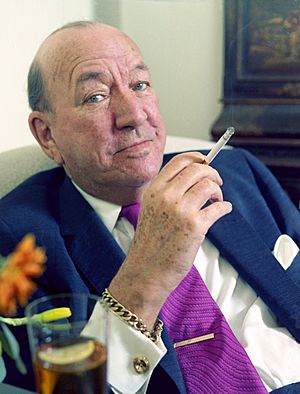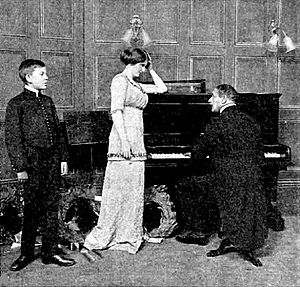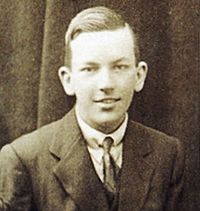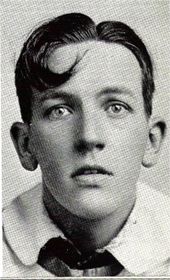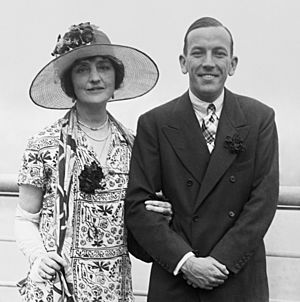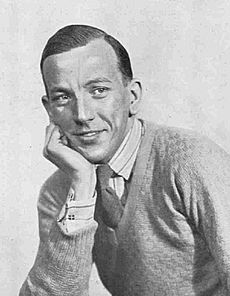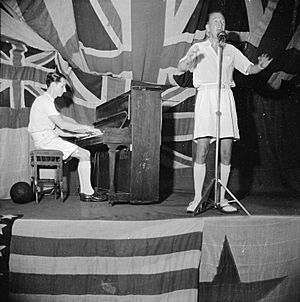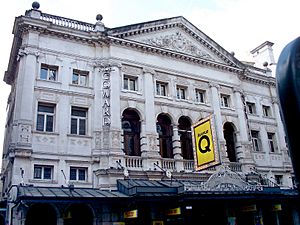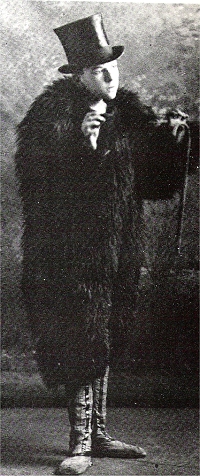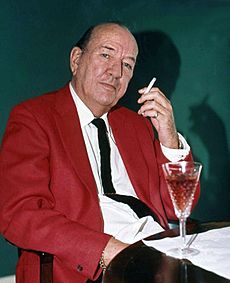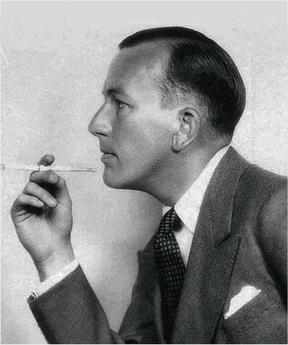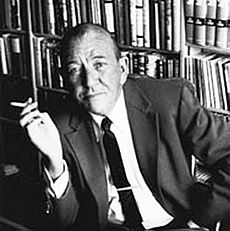Noël Coward facts for kids
Sir Noël Peirce Coward (born December 16, 1899 – died March 26, 1973) was a very famous English playwright, composer, director, actor, and singer. He was known for his clever humor, his fancy style, and what Time magazine called "a sense of personal style." He was truly a master of many talents!
As a child, Noël went to a dance school in London. He started performing on stage when he was just eleven years old. When he was a teenager, he met many people in high society. This group of people often became the characters in his plays. Noël Coward became a very successful playwright, writing over 50 plays from his teenage years onwards. Many of his plays, like Hay Fever, Private Lives, Design for Living, Present Laughter, and Blithe Spirit, are still performed in theaters today.
He also wrote hundreds of songs and more than a dozen musical plays. He wrote movie scripts, poems, short stories, a novel, and even his own life story in three books. Noël Coward acted and directed on stage and in films for sixty years. He often starred in his own works, but also in plays and movies by others.
When World War II started, Coward wanted to help. He worked for the British government in Paris, helping with information. He also worked with the Secret Service, using his fame to try and convince Americans to help Britain. In 1943, Coward won a special Academy Honorary Award for his naval film In Which We Serve. He was made a knight in 1970, becoming "Sir Noël Coward." In the 1950s, he became popular again as a cabaret performer, singing his own songs like "Mad Dogs and Englishmen" and "London Pride".
Noël Coward's plays and songs became very popular again in the 1960s and 1970s. His work and unique style still inspire people in popular culture today. The Albery Theatre in London was renamed the Noël Coward Theatre in his honor in 2006.
Contents
The Life of Noël Coward
Early Life and First Steps
Noël Coward was born in 1899 in Teddington, a suburb of London. His father, Arthur, sold pianos, and his mother, Violet, was the daughter of a Royal Navy captain. Noël was the second of three sons. His older brother had passed away before Noël was born. The family often struggled with money.
Noël loved performing from a young age. He appeared in amateur shows by age seven. He went to the Chapel Royal Choir School for a short time. He didn't have much formal schooling, but he loved to read many books.
Childhood Dreams
Noël's mother encouraged him to pursue acting. She sent him to a dance academy in London. His first professional acting job was in January 1911. He played Prince Mussel in a children's play called The Goldfish. Noël later wrote about how excited he was. He saw an advertisement looking for a "talented boy of attractive appearance." He felt sure he was the perfect fit!
A famous actor-manager named Charles Hawtrey became Noël's mentor. Noël looked up to him and learned a lot about theater. Hawtrey cast Noël in the children's play Where the Rainbow Ends. Noël performed in this play in 1911 and 1912 in London's West End. In 1912, Noël also danced in a ballet at the Savoy Theatre. He appeared in another play with Hawtrey at the London Coliseum.
In 1913, Noël was hired by the Italia Conti to perform at the Liverpool Repertory Theatre. That same year, he played the Lost Boy Slightly in Peter Pan. He played in Peter Pan again the next year. In 1915, he was back in Where the Rainbow Ends. During this time, he worked with other young actors. One of them was Gertrude Lawrence, who became a lifelong friend.
In 1914, when Noël was fourteen, he was mentored by Philip Streatfeild, a painter. Streatfeild introduced him to important people in high society. Even after Streatfeild passed away, Noël remained friends with these influential people.
Noël continued acting during most of World War I. He appeared in The Happy Family in 1916. In 1917, he was in The Saving Grace, a comedy. He learned many comedy acting tips from Hawtrey during this time.
In 1918, Coward joined the army, but he was found unfit for active service due to health reasons. He was discharged after nine months. That year, he had a small, uncredited role in the film Hearts of the World. He also started writing plays. His first solo play was The Rat Trap (1918). During these years, he met Lorn McNaughtan, who became his private secretary for over forty years.
Becoming a Star
In 1920, at age 20, Coward starred in his own play, I'll Leave It to You. It was his first full-length play in London's West End. Critics had mixed but encouraging reviews. The Times called it "a remarkable piece of work from so young a head."
After this play, Coward acted in works by other writers. He starred in The Knight of the Burning Pestle in 1920. He didn't enjoy the role much, but critics thought he did well.
In 1921, Coward visited America for the first time. He hoped to get his plays produced there. He didn't have much luck, but he was inspired by the exciting Broadway theater. He brought that energy into his own writing. This led to his first real success as a playwright with The Young Idea. This play opened in London in 1923, with Coward in a main role. Critics praised it, and it ran for several weeks.
In 1924, Coward had his first big success with the play The Vortex. This play was a hit in both London and America. Its success created a huge demand for new Coward plays.
Big Hits and New Ideas
In 1925, he premiered Fallen Angels, a comedy. Also in 1925, Hay Fever appeared. This play became one of Coward's most lasting works. It's a comedy about a very artistic family who invite guests to their country house. They end up confusing and annoying everyone! By the 1970s, Hay Fever was seen as a classic. It was described as a "dazzling achievement" that simply aimed to delight.
By June 1925, Coward had four shows running in London's West End! He was writing many plays and acting in his own and others' works. This busy schedule eventually caught up with him. He collapsed while starring in The Constant Nymph. Doctors told him to rest, but he went to the US for rehearsals. He collapsed again in New York and had to take a long rest in Hawaii.
Other Coward plays from the mid-to-late 1920s included Easy Virtue (1926) and The Marquise (1927). He also wrote revues like On with the Dance (1925). His biggest failure during this time was the play Sirocco (1927). Audiences disliked it so much they even spat at Coward as he left the theater!
By 1929, Coward was one of the world's highest-paid writers. He continued to be very successful during the Great Depression. He wrote many popular hits, from big shows to small comedies. One big show was the musical play Bitter Sweet (1929). Another was the huge historical show Cavalcade (1931). This play needed a massive cast and complex stage effects. Its 1933 film version won an Academy Award for best picture.
Coward's smaller hits included Private Lives (1930) and Design for Living (1932). In Private Lives, Coward starred with his famous stage partner, Gertrude Lawrence. Young Laurence Olivier also starred. It was a huge success in London and New York. Coward didn't like long runs, so he decided to act in a play for no more than three months at a time.
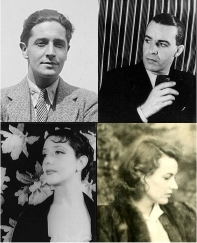
In 1933, Coward wrote, directed, and starred in Conversation Piece. He then wrote, directed, and starred with Lawrence in Tonight at 8.30 (1936). This was a series of ten short plays. One of these plays, Still Life, was later made into the famous 1945 film Brief Encounter. Coward's last plays before the war were This Happy Breed and Present Laughter. These were first performed in 1942, though written in 1939.
Between 1929 and 1936, Coward recorded many of his famous songs. These included the romantic "I'll See You Again" and the funny "Mad Dogs and Englishmen".
Coward During Wartime
When World War II began, Coward stopped his theater work to help with the war effort. He managed a British information office in Paris. He also worked with British intelligence. His job was to use his fame to convince the American public and government to support Britain. He was frustrated by some British newspapers criticizing his travels. They didn't know he was working for the Secret Service. In 1942, King George VI wanted to make Coward a knight for his efforts. However, Prime Minister Winston Churchill advised against it, partly due to public opinion about Coward's lifestyle.
If Germany had invaded Britain, Coward was on a list of people to be arrested and killed. This list, called The Black Book, included other famous figures. When he found out after the war, Coward joked about it.
Churchill believed Coward could help the war more by entertaining soldiers and people at home. So, Coward followed this advice. He tirelessly toured, acted, and sang in Europe, Africa, Asia, and America. He wrote and recorded popular war songs like "London Pride". His London home was destroyed by German bombs in 1941. He stayed at the Savoy Hotel temporarily. During one air raid, he performed an impromptu show with other artists to distract guests.
Another of Coward's wartime projects was the naval film drama In Which We Serve. He wrote, starred in, composed music for, and co-directed this film. It was popular in both America and Britain. He received a special award at the 1943 Academy Awards. Coward played a naval captain, basing the character on his friend Lord Louis Mountbatten.
Coward's most famous work from the war years was the very successful comedy Blithe Spirit (1941). It's about a writer who tries to research the supernatural. A séance brings back the ghost of his first wife, causing chaos for him and his second wife. This play ran for 1,997 performances in London, breaking records. It was also made into a 1945 film. In 1942, Coward toured with Blithe Spirit, Present Laughter, and This Happy Breed.
After the war, Coward wrote a play called Peace In Our Time. It imagined what England would be like if Nazi Germany had occupied it.
Later Career and Legacy
After the war, Coward's new plays were somewhat successful but didn't reach the same level of popularity as his earlier hits. Relative Values (1951) explored the differences between an English aristocratic family and a Hollywood actress. South Sea Bubble (1951) was a political comedy set in a British colony.
Two of his musicals, Pacific 1860 (1946) and Ace of Clubs (1949), were not financially successful. Despite these challenges, Coward remained a public figure. His cabaret act, which he perfected entertaining troops during the war, became a huge success. He performed in London and later in Las Vegas. A theater critic, Kenneth Tynan, described his performances as elegant and enthusiastic.
In 1955, Coward's Las Vegas cabaret act was so popular that CBS hired him to create three television specials. The first, Together With Music, featured him with Mary Martin. He also starred in TV versions of Blithe Spirit and This Happy Breed.
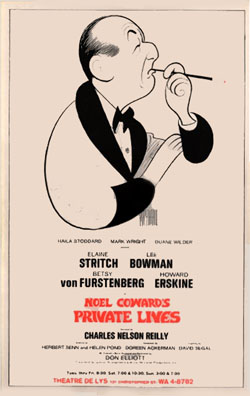
During the 1950s and 1960s, Coward continued to write musicals and plays. Sail Away (1961), set on a luxury cruise ship, was his most successful musical after the war. His later plays included Look After Lulu! (1959), a comedy, and Waiting in the Wings (1960), about old age. His comic novel, Pomp and Circumstance (1960), was also well-received.
Coward's final stage success was Suite in Three Keys (1966), a trilogy of plays set in a hotel. He wrote it as his last acting performance on stage. The plays received great reviews. In one play, A Song at Twilight, Coward played a character who was openly homosexual, which was a bold move for him. This daring play earned him new praise.
Coward also found new popularity in several films later in his career. These included Around the World in 80 Days (1956), Our Man in Havana (1959), and The Italian Job (1969). He turned down many famous roles, including the king in The King and I and the villain in the first James Bond film, Dr. No.
In the mid-1960s and early 1970s, successful revivals of his old plays and new shows celebrating his music brought Coward new fame. He called this comeback "Dad's Renaissance." It started with a hit revival of Private Lives in 1963. He was even invited to direct Hay Fever at the National Theatre.
Time magazine noted that in the 1960s, Coward's best work seemed to have a special charm.
Death and Honours
By the late 1960s, Coward's health was declining. He struggled with memory loss during the run of Suite in Three Keys. This also affected his work in The Italian Job, and he retired from acting soon after.
Coward was made a knight in 1970. He also received a Tony Award for his lifetime achievements in theater that same year. In 1972, he was given an honorary degree from the University of Sussex.
Noël Coward passed away at his home in Jamaica on March 26, 1973, at the age of 73. He was buried three days later on a hill overlooking the island's north coast. A memorial service was held in London, where famous actors and musicians paid tribute to him. On March 28, 1984, a memorial stone was placed in Poets' Corner in Westminster Abbey.
The New Theatre in London was renamed the Noël Coward Theatre in his honor in 2006. A statue of Coward was unveiled in the foyer of the Theatre Royal, Drury Lane, in 1998. There are also sculptures of him in New York and Jamaica, and a bust in the library in Teddington, where he was born. Exhibitions celebrating Coward's life and work have been held in London, San Francisco, and Beverly Hills.
Personal Life
Noël Coward was a private person about his personal life. His most important relationship was with the actor Graham Payn. It began in the mid-1940s and lasted until Coward's death. Payn later helped publish a collection of Coward's diaries.
Coward had many close friendships with women. These included the actress and writer Esmé Wynne-Tyson, his first writing partner. He was also close friends with his secretary Lorn Loraine and actresses like Gertrude Lawrence and Marlene Dietrich.
Coward was known for his kindness and generosity. He often quietly helped old theater friends who were struggling financially. From 1934 to 1956, he was the president of the Actors Orphanage, which supported children of actors. He became the godfather to a young boy named Peter Collinson from the orphanage. He helped Collinson start his career in show business. When Collinson became a successful director, he invited Coward to act in The Italian Job.
In 1926, Coward bought Goldenhurst Farm in Kent, England, and lived there for nearly thirty years. In the 1950s, Coward moved out of the UK for tax reasons. He first lived in Bermuda, then bought homes in Jamaica and Switzerland. These remained his homes for the rest of his life. His neighbors and friends in these places included famous people like David Niven and Elizabeth Taylor.
Coward's political views were generally conservative. However, he disagreed with some government policies. He believed that theater should be a place of "strange enchantment" and "dreams," not for political messages. Despite this, some of his plays, like Cavalcade, did show his conservative views. He was also agnostic, meaning he wasn't sure if he believed in God.
Coward always spelled his first name "Noël" with the two dots over the "e." He said it was important for the correct pronunciation.
Public Image
Noël Coward was famous for his carefully created public image. He once asked, "Why am I always expected to wear a dressing-gown, smoke cigarettes in a long holder and say 'Darling, how wonderful'?" This image came from his love for a fancy lifestyle. He famously said, "I am determined to travel through life first class."
He first wore a dressing gown on stage in The Vortex. He used this stylish look in other famous plays like Private Lives. He was seen as a modern "dandy," a man who cares a lot about his appearance. The Independent newspaper noted that his "famous silk, polka-dot dressing gown and elegant cigarette holder" were iconic.
Coward was happy to use his lifestyle to get publicity. In 1969, he told Time magazine, "I acted up like crazy. I did everything that was expected of me. Part of the job." Time concluded that Coward's greatest gift was "projecting a sense of personal style."
Coward's unique, clear way of speaking came from his childhood. His mother was deaf, and he developed his distinct style to make it easier for her to hear him. It also helped him overcome a slight lisp. His nickname, "The Master," started as a joke but became true. He would often make light of it, saying, "Jack of all trades, master of none." But he also joked about his own importance, saying, "My sense of my own importance to myself is tremendous."
Works and Appearances
Noël Coward wrote over 65 plays and musicals. He appeared in about 70 stage productions. More than 20 films were made from his plays and musicals. He also acted in 17 films himself.
Plays
Experts divide Coward's plays into early, middle, and late periods. His plays from the 1920s and 1930s are considered the most important theater works between World War I and World War II. Hay Fever (1925) is a good example of his early plays. It shows a very theatrical family confusing a group of quiet outsiders.
In the 1930s, Coward tried out new theater styles. The huge historical play Cavalcade (1931) had a massive cast. His series of ten short plays, Tonight at 8.30 (1935), played to full houses. Coward also pushed social boundaries. Design for Living (1932), which featured a love triangle, had to premiere in the US to avoid British censors. Women in Coward's plays from this time were often as strong and emotional as the men.
The most famous plays from Coward's middle period (late 1930s and 1940s) are Present Laughter, This Happy Breed, and Blithe Spirit. These plays are more traditional. Coward toured them across Britain during World War II. The first and third of these are still often performed today.
Coward's plays from the late 1940s and early 1950s are generally seen as less exciting. However, his final plays, Suite in Three Keys (1966), were well-received. But the Coward plays that are most often revived are from 1925 to 1940. These include Hay Fever, Private Lives, Design for Living, Present Laughter, and Blithe Spirit.
Musicals and Revues
Coward wrote the words and music for eight full-length musicals between 1928 and 1963. The most successful was his first, Bitter Sweet (1929). It ran for 697 performances in London. Bitter Sweet was set in 19th-century Vienna and London. For his next musical, Conversation Piece (1934), Coward again chose a historical setting.
His last two musicals premiered in New York. Sail Away (1961), set on a modern cruise ship, was his most successful post-war musical. His last musical, The Girl Who Came to Supper (1963), was less successful.
Coward also contributed to revues, which are shows with songs, dances, and sketches. His early revues, On With the Dance (1925) and This Year of Grace (1928), were popular. They included well-known songs like "Dance, Little Lady" and "A Room With a View". Later revues like Words and Music (1932) featured "Mad About the Boy" and "Mad Dogs and Englishmen".
His last original revue was Sigh No More (1945). It was a moderate success. Later in his life, two revues celebrating his songs were created: Cowardy Custard in London and Oh, Coward! in New York.
Songs
Coward wrote three hundred songs. The Noël Coward Society lists "Mad About the Boy" as his most popular song. Other popular songs include:
- "I'll See You Again" (from Bitter Sweet)
- "Mad Dogs and Englishmen" (from Words and Music)
- "If Love Were All" (from Bitter Sweet)
- "Someday I'll Find You" (from Private Lives)
- "I'll Follow My Secret Heart" (from Conversation Piece)
- "London Pride" (1941)
- "A Room With a View" (from This Year of Grace)
- "Mrs Worthington" (1934)
- "Poor Little Rich Girl" (from On with the Dance)
- "The Stately Homes of England" (from Operette)
Coward was influenced by the songs of Gilbert and Sullivan from his childhood. His colleague Terence Rattigan said Coward was "the best of his kind since W. S. Gilbert."
Critical Reputation and Legacy
The playwright John Osborne said that Coward was "his own invention and contribution to this century." Critic Kenneth Tynan wrote that even in fifty years, people would know what "a very Noel Coward sort of person" meant. Lord Mountbatten praised Coward's many talents, saying he combined the skills of fourteen different people.
Critics in the 1930s thought Coward's plays might not last. But by the 1960s, critics started to see that beneath the witty dialogue, his best plays had emotional depth. By the time he passed away, The Times newspaper called him one of the most versatile figures in English theater. They ranked his plays with classics by Congreve, Sheridan, Wilde, and Shaw. In 1999, a poll by The Stage newspaper named Shakespeare first and Coward second among those who most influenced British arts.
To celebrate 100 years since his birth in 1999, many of Coward's plays were performed. A special celebration at the Savoy Theatre featured over 30 leading performers. Many famous musicians have recorded Coward's songs.
Coward's music, writings, voice, and style have been widely copied and made fun of in a good way. He has often been shown as a character in plays, films, and TV shows. For example, in the 1968 film Star!, Coward was played by his godson, Daniel Massey. He has also been a detective and a spy in BBC Radio 4 series.
Coward admired the plays of Harold Pinter. Some critics believe Coward influenced Pinter's writing style. Pinter even directed a revival of Coward's Blithe Spirit in 1976.
|
See also
 In Spanish: Noël Coward para niños
In Spanish: Noël Coward para niños
 | Janet Taylor Pickett |
 | Synthia Saint James |
 | Howardena Pindell |
 | Faith Ringgold |


